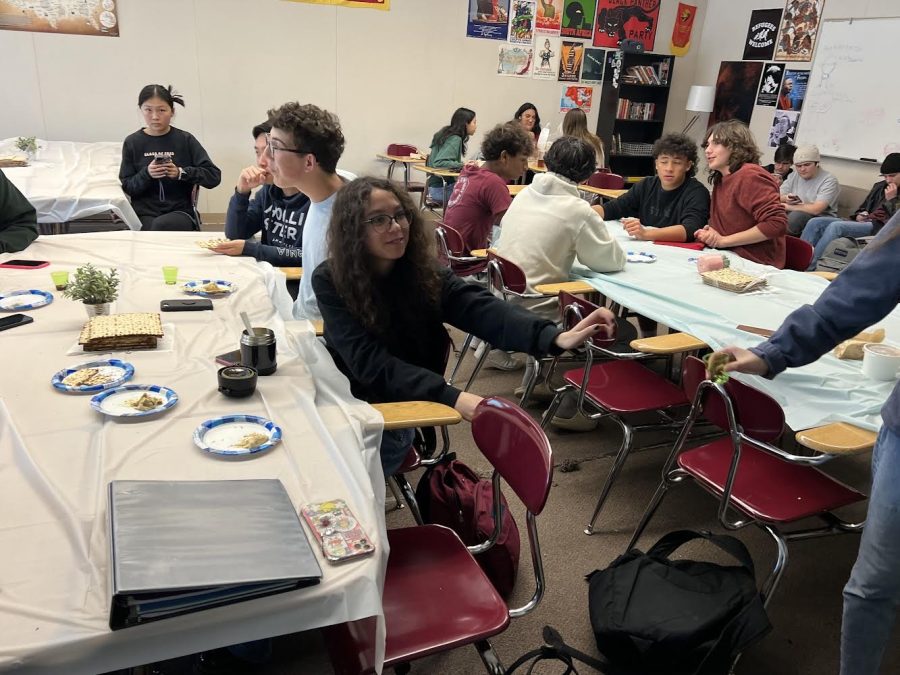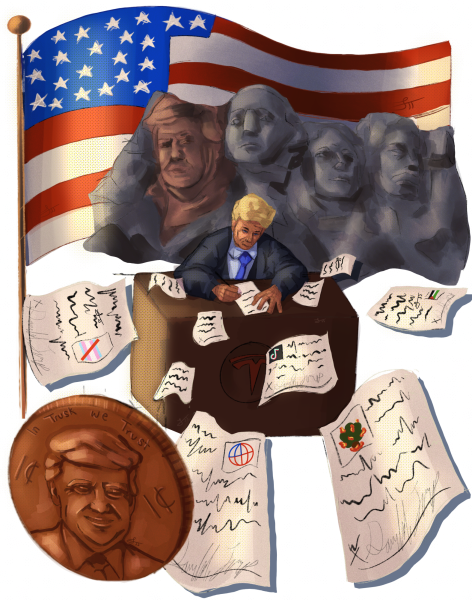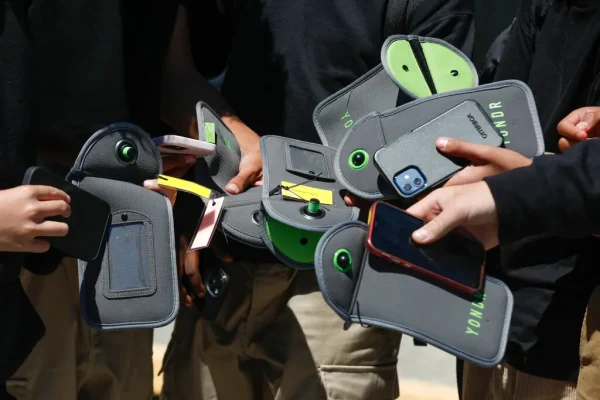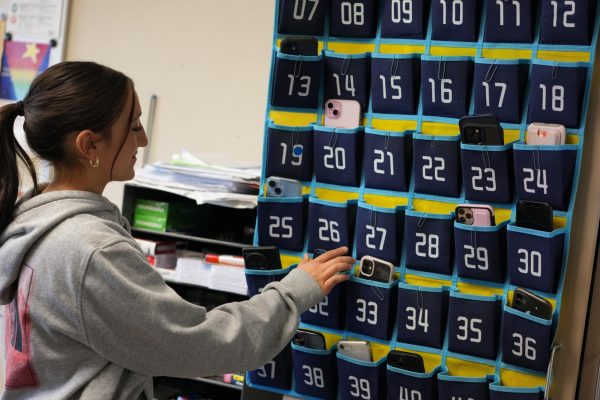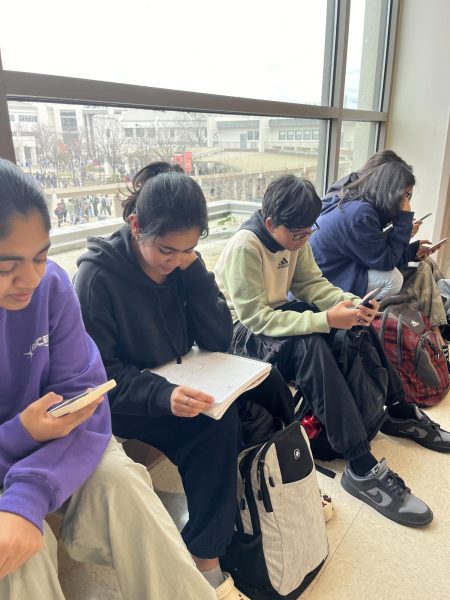Cal High’s Jewish Student Union celebrates Passover
JSU hosts event to honor the holiday with food and games during club meeting this month
Photo courtesy of Michelle Osnovikov
Members of the Jewish Student Union celebrated Passover on campus on April 14. Students ate matzah, enjoyed many dips, drank grape juice, and played a game of afikomen.
Passover is a Jewish holiday celebrating the Biblical story of when the Israelites were liberated from Egypt.
This holiday takes place over a span of eight days, starting on the 15th day of the Hebrew month of Nisan, the first month of Aviv or spring. This year, Passover fell on April 5-13.
“It’s the story of Moses and Exodus from Egypt when Jews were enslaved,” Jewish Student Union (JSU) president senior Michelle Osnovikov said. “It’s the story of Moses, with the plagues, and how [the Jews] went from Egypt to Israel.”
Passover celebrates the story of when the Jews escaped Egypt, which is told in the second chapter of the Torah. The Torah is the holy book of Judaism that consists of the first five chapters of the Hebrew Bible. This story focuses on Moses, who parted the Red Sea to escape from the Egyptians.
Now, this story is celebrated by a holiday typically celebrated with family and friends.
“Every year, I have a seder dinner with my family,” sophomore Billy Piggott said.
Typically during the seder dinner, people eat foods in a specific order, which is called seder because it directly translates to order. Each item on a seder table represents something from the time of slavery in Egypt.
Mashed-up walnuts and apples represent the bricks that were used to build structures in Egypt. Parsley dipped in salt water is used to remember tears shad, while bitter herbs help those remember the pain of slavery.
JSU celebrated this holiday during a meeting on April 14. The regular meetings are hosted to celebrate and honor Jewish culture.
“Our main goal is to celebrate Jewish holidays,” senior JSU board member Shawn Reznikov said. “It is not only for Jewish people but also for people who are willing to learn more about the culture and embrace themselves with the diversity.”
Mah Nishtanah, which means, “Why is this night different from all the other nights”, are four questions that state the rules of Passover. The Mah Nishtanah is typically recited or sung by the youngest person at the seder table.
“In Passover, there are several different rules you have to follow,” Piggott said. “For example, you aren’t allowed to sit in a chair. You have to be reclining, and you aren’t allowed to eat anything that rises, or leavened. You can only eat flat matzah.”
Matzah is a type of unleavened bread that is integral to Jewish culture, as it serves as a reminder of the foods eaten by the fleeing slaves. It also follows the rules of Passover.
The reason why people must eat flat bread like matzah instead of risen bread during Passover is because the Jews did not have enough time to make risen bread during Passover.
To celebrate Passover, the JSU made a presentation about the history of the holiday and explained what the seder plate was. Other foods at the seder table are dips and grape juice, as well as matzah, all integral elements of the Passover festival.
Students also participated in afikomen, a game that is usually played when pieces of matzah are hidden around the room. The game of afikomen represents many ideas, such as the ultimate redemption of suffering that the Jews felt, or as reference to the Passover sacrifices made at ancient Jerusalem temples. The winner received a prize of socks, pickles, and cider.
“Usually there is a prayer book or guide that you follow where everything is done in a specific order,” senior Ben Lewis said. “You read about the history of the Israelites while performing certain actions that reflect the history.”
Lewis explained how when people review the story of the 10 plagues, they dip their finger into grape juice or wine, and recite the 10 plagues as they put their finger on a plate, which symbolizes the 10 plagues that were brought upon Egypt.
There are also other activities that people can participate in to celebrate the holiday. These include singing songs that go back to traditions, and many more.
The story of Passover starts when the Pharaoh of Egypt begins to worry about the Jews outnumbering the Egyptians, so the Pharaoh forces the Jews into slavery. Another rule was to drown every son born to the Hebrews in the Nile. Moses, a Hebrew-born child, had been saved and adopted by the Pharaoh’s daughter.
When Moses grew up, God told him to command the Pharaoh to free the Jews. But after the Pharaoh doesn’t allow them to leave, God sends the 10 Plagues.
These plagues continued and during the 10th plague, God passed through Egypt and killed the firstborn of each household. The Jews were told to mark their doors with the blood of the sacrificed lamb and their homes were passed.
During this plague, the Pharaoh’s son was killed, making the Pharaoh change his mind about keeping the Jews enslaved. But as a last-minute decision, he and his army chased after the Jews. The chase ended with them being killed, as the Red Sea, parted by the power of God vested in Moses, closed right after all the Jews passed through, which drowned the Egyptians.
Now, this Jewish holiday is celebrated as remembrance of the past and the emancipation of the Israelites.
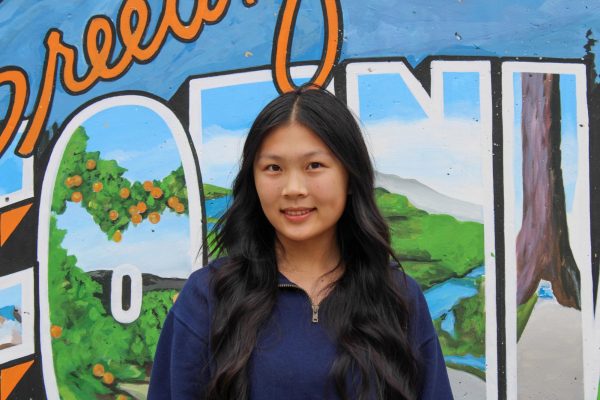
Senior Yining Xie is a Managing Editor for the Californian and has been on staff for three years. She is excited to work more on the design and layout...
